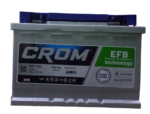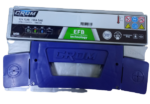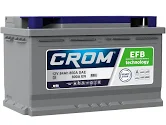EFB Batteries: Advancing Automotive Energy Storage for Enhanced Start-Stop Systems
As automotive technology continues to evolve, energy storage solutions play a crucial role in enhancing vehicle efficiency and reducing environmental impact. Enhanced Flooded Batteries (EFB) represent a significant advancement in battery technology, specifically designed to meet the demands of modern start-stop systems. In this comprehensive exploration, we delve into the intricacies of EFB batteries, their applications, advantages, and the transformative impact they have on automotive energy storage.
Understanding EFB Battery Technology:
EFB batteries belong to the family of lead-acid batteries, sharing similarities with traditional flooded batteries but featuring enhancements to address the challenges posed by start-stop systems. Start-stop technology, which automatically shuts off the engine when the vehicle comes to a stop and restarts it when needed, places unique demands on the battery. EFB batteries are engineered to meet these demands effectively.
The key differentiator in EFB batteries lies in the construction of the positive plate, where a more robust design with added components improves the battery’s ability to handle frequent charge and discharge cycles. This enhanced design makes EFB batteries well-suited for applications where conventional batteries may struggle to provide optimal performance and longevity.
Applications of EFB Batteries:
- Start-Stop Systems: The primary application of EFB batteries is in vehicles equipped with start-stop systems. Start-stop technology is designed to reduce fuel consumption and emissions by automatically turning off the engine when the vehicle is stationary and restarting it seamlessly when the driver accelerates. EFB batteries play a critical role in supporting the increased number of engine starts and stops associated with this technology.
- Micro-Hybrid Vehicles: EFB batteries are commonly used in micro-hybrid vehicles, which incorporate certain energy-saving features without a full hybrid drivetrain. These vehicles leverage start-stop systems and regenerative braking, and EFB batteries are well-suited to meet the energy storage requirements of these applications.
- Highly Cyclic Applications: EFB batteries find use in applications that demand high cyclic durability, such as recreational vehicles (RVs), marine applications, and off-road vehicles. Their ability to handle frequent charge and discharge cycles makes them suitable for these environments.
- Commercial Vehicles: In the commercial vehicle sector, where stop-and-go traffic is common, EFB batteries prove beneficial. Delivery trucks, buses, and other commercial vehicles with start-stop systems benefit from the durability and performance characteristics of EFB technology.
Advantages of EFB Batteries:
- Cyclic Durability: EFB batteries are designed to withstand a high number of charge and discharge cycles. This cyclic durability is a key advantage, especially in applications with frequent engine starts and stops, ensuring long-lasting performance.
- Improved Charge Acceptance: EFB batteries exhibit enhanced charge acceptance, allowing them to recharge quickly during vehicle operation. This feature is crucial in start-stop systems, where the battery needs to rapidly recharge after each engine stop to be ready for the next start.
- Enhanced Durability in Partial State of Charge (PSoC): Start-stop systems often operate in a Partial State of Charge (PSoC), meaning the battery is not fully charged or discharged during each cycle. EFB batteries are designed to perform well in PSoC conditions, providing reliable performance and durability in these scenarios.
- Vibration Resistance: Automotive environments can be harsh, with constant vibrations from road conditions. EFB batteries are built with enhanced vibration resistance, ensuring durability and reliability, particularly in commercial vehicles and off-road applications.
- Affordability: Compared to more advanced technologies like Lithium-ion batteries, EFB batteries offer an affordable solution for applications that require cyclic durability and rapid charge acceptance. This makes them a cost-effective choice for start-stop systems and micro-hybrid vehicles.
- Compatibility with Standard Charging Systems: EFB batteries are designed to be compatible with standard vehicle charging systems, simplifying integration into existing automotive platforms. This compatibility enhances their versatility and adoption in various vehicle types.
Challenges and Considerations:
While EFB batteries offer significant advantages, there are certain considerations and challenges associated with this technology:
- Temperature Sensitivity: Like many lead-acid batteries, EFB batteries can be sensitive to temperature extremes. Proper thermal management and consideration of the operating environment are essential to maximize their performance and lifespan.
- Limited Energy Density: Compared to advanced energy storage solutions like Lithium-ion batteries, EFB batteries have limited energy density. This limitation makes them suitable for specific applications but may not be ideal for situations requiring high energy storage capacity in a compact form.
- Depth of Discharge: EFB batteries perform optimally with shallow discharges. Deep discharges may impact their lifespan and overall performance. Proper system design and monitoring are crucial to ensure the batteries are used within their recommended depth of discharge limits.
- Advancements in Battery Technology: As automotive technology continues to advance, alternative energy storage solutions, such as Lithium-ion batteries, are gaining prominence. While EFB batteries are well-suited for specific applications, the landscape of automotive energy storage is dynamic, and the industry may see further advancements.
Conclusion:
In conclusion, EFB batteries represent a significant advancement in lead-acid battery technology, specifically tailored to meet the demands of modern automotive applications, especially those equipped with start-stop systems. Their ability to handle frequent charge and discharge cycles, rapid charge acceptance, and affordability make them a preferred choice for various vehicle types, including micro-hybrids and commercial vehicles. As automotive technology continues to evolve, EFB batteries play a pivotal role in advancing energy storage solutions, contributing to improved fuel efficiency, reduced emissions, and enhanced overall performance in the automotive industry.





